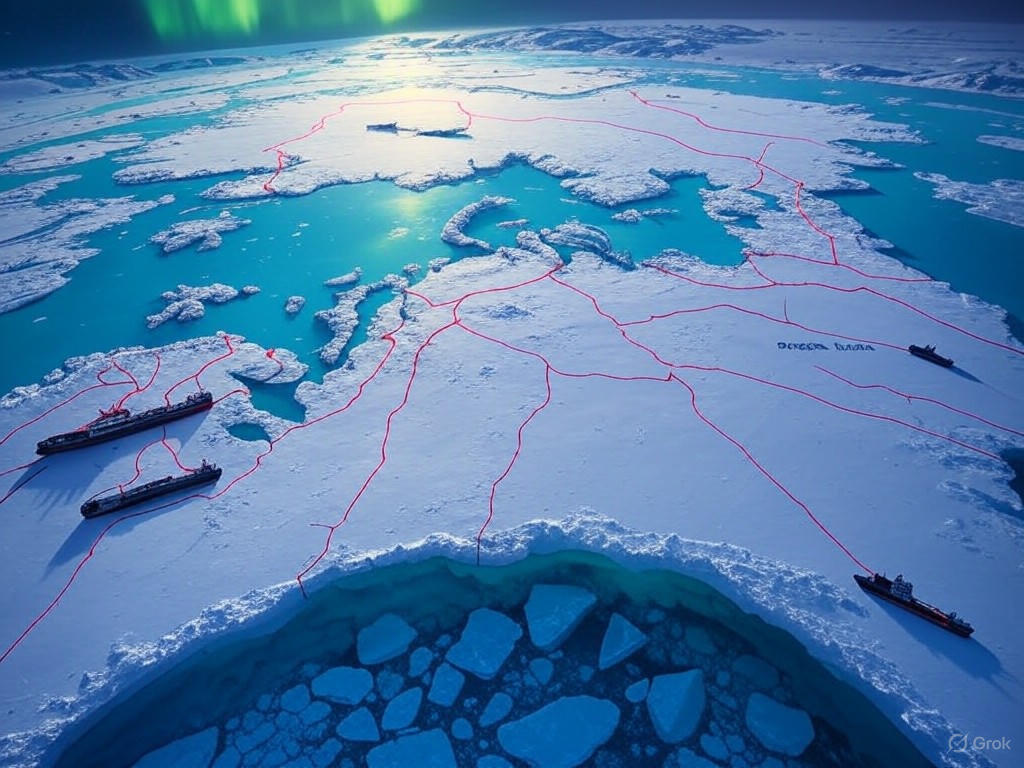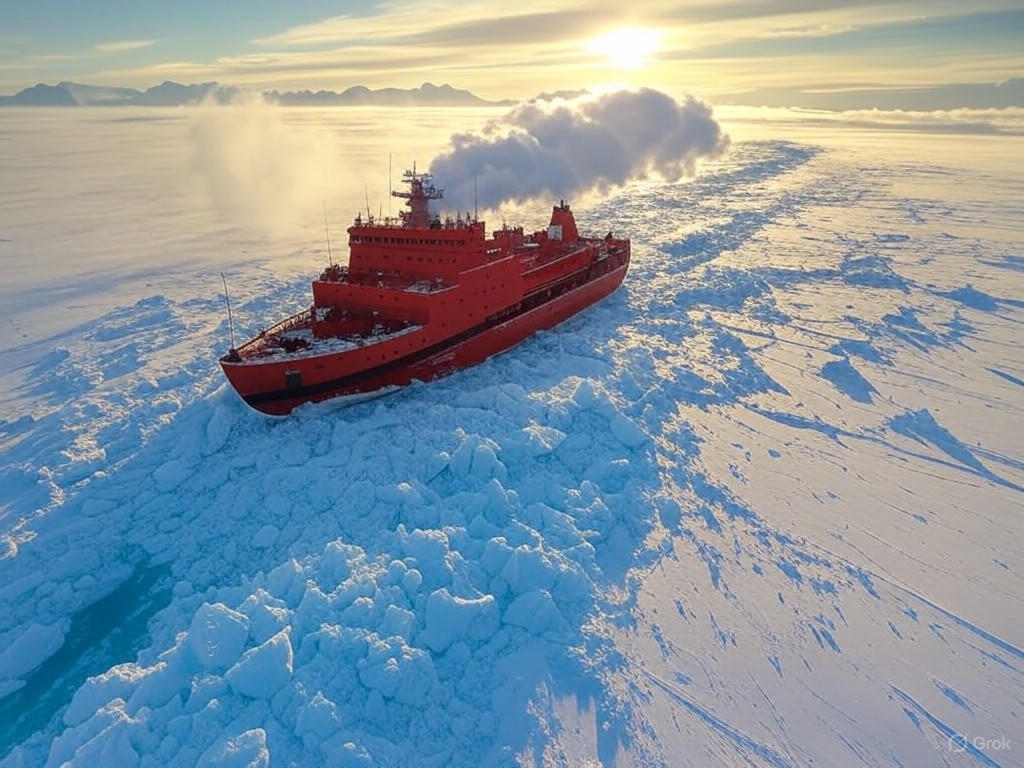Arctic Shipping Routes: Russia and China’s New Frontier
In the vast, icy expanse of the Arctic, where the sun dips below the horizon for months on end, a quiet revolution is underway. Melting ice caps, a byproduct of decades of industrial progress, are carving out new shipping routes that promise to reshape global trade. As Jonah Stynebeck, I've always appreciated the pragmatic side of human ingenuity—turning what some call catastrophe into opportunity. Yet, as Russia and China maneuver for control, this emerging frontier raises questions about sovereignty, free markets, and the limits of international cooperation. From a center-right lens, the Arctic isn't just a chessboard for superpowers; it's a test of whether unfettered trade can prevail without the heavy hand of government meddling. Let's unpack this thawing drama, balancing the economic windfalls against the geopolitical tempests.
The Arctic's transformation is no minor thaw; it's a fundamental shift in the world's circulatory system. Satellite data reveals that summer ice extent has shrunk by about 13% per decade since 1979, opening passages like the Northern Sea Route (NSR) that could slash shipping times between Asia and Europe by up to 40%. NASA Climate Change paints a stark picture: what was once impassable now beckons as a shortcut for commodities, from Chinese manufactured goods to Russian oil. This isn't just about convenience; it's about efficiency in a global economy that thrives on competition. Imagine, if you will, a world where free markets dictate the flow of goods, unencumbered by the bureaucratic quagmires that often stifle innovation. But as with any frontier, where opportunity knocks, so do the gatekeepers—Russia and China, each eyeing the Arctic as their next great prize.
The Allure of New Shipping Routes and Economic Stakes
The melting Arctic ice has birthed shortcuts that could redefine international commerce. The NSR, hugging Russia's northern coast, offers a tantalizing alternative to the Suez Canal, potentially cutting voyage distances by thousands of miles. For China, this route is a linchpin in its Belt and Road Initiative, extending its economic reach without the vulnerabilities of chokepoints like the Strait of Malacca. Beijing's investment in polar research vessels and infrastructure speaks to a calculated play for influence, framing the Arctic as an extension of its free-market ambitions—albeit with a heavy dose of state-backed capitalism. Russia, meanwhile, leverages its geographic advantage, having invested billions in modernizing ports and icebreakers to monopolize access. As The Wall Street Journal reports, Moscow's control over 53% of the Arctic coastline gives it a natural edge, turning what was frozen wilderness into a revenue stream for energy exports.
Yet, this rush for routes isn't without its ironies. From a pragmatic standpoint, the economic benefits are undeniable: shorter transit times could reduce fuel costs by 20–30%, according to industry analyses, boosting global GDP through enhanced trade efficiency. But let's not romanticize it—China's foray into the Arctic, often through joint ventures with Russian firms, raises eyebrows about fair play in free markets. Beijing's state-directed investments blur the lines between public and private enterprise, potentially crowding out Western competitors who rely on genuine market dynamics. As someone who favors limited government interference, I see this as a cautionary tale: when nations mix geopolitics with commerce, the result is often a distorted playing field, where traditional values of sovereignty and mutual respect get sidelined for strategic gains.

This detailed map illustrates the emerging Northern Sea Route, highlighting key chokepoints and Russian-controlled ports, underscoring the strategic chess game unfolding in the frozen north.
Balancing these opportunities are the environmental concerns that inevitably tag along. The same melting ice accelerating shipping routes is a reminder of broader ecological shifts, with rising sea levels and disrupted marine ecosystems. Yet, from a center-right perspective, we must resist the urge to over-regulate. Instead of imposing blanket international treaties that stifle innovation, governments should encourage private-sector solutions—like advanced ice-class vessels or carbon-capture technologies—that align with market incentives. The Arctic Council, a forum for Arctic nations, has been a mixed bag; while it promotes cooperation, its recommendations often lean toward excessive oversight. The Council on Foreign Relations notes that such bodies can bog down progress, advocating instead for bilateral agreements that respect national interests without global mandates.
Geopolitical Maneuvering: Russia and China in the Spotlight
As the ice recedes, the geopolitical theater intensifies. Russia, with its vast Arctic territory, has been assertively claiming exclusive rights to the NSR, deploying military assets to enforce its vision of a controlled corridor. This isn't saber-rattling for show; it's a pragmatic defense of national sovereignty, ensuring that resources extracted from its permafrost benefit its economy first. China, lacking a direct Arctic border, plays the long game as an "observer" state in the Arctic Council, investing in infrastructure projects that echo its global trade ambitions. Reports from The Center for Strategic and International Studies highlight how Beijing's Polar Silk Road initiative aims to integrate the Arctic into its supply chains, potentially challenging U.S. dominance in Pacific trade routes.
This rivalry isn't just about shipping; it's a proxy for broader power dynamics. Russia sees the Arctic as a bulwark against Western sanctions, using its energy reserves to court Chinese partnerships. China, in turn, views it as a gateway to resources, from rare earth minerals to fisheries. But let's inject a dose of dry wit here: in a world obsessed with efficiency, these two nations are essentially racing to plant their flags on melting icebergs, all while the rest of us debate the bill. From a free-market standpoint, this competition could spur innovation—if left unchecked by excessive government intervention. Imagine private firms from non-Arctic nations, like those in Europe or the U.S., negotiating access through open bidding, rather than through opaque state deals. That's the traditional value of fair competition at work, fostering global prosperity without the need for multilateral bureaucracies.

This image captures a Russian nuclear-powered icebreaker forging through the Arctic waters, symbolizing Moscow's assertive control over emerging shipping lanes and its role in the geopolitical scramble.
Of course, the environmental fallout can't be ignored. Warmer waters are already disrupting indigenous communities and wildlife, with species like polar bears facing habitat loss. But rather than framing this as a call for sweeping regulations, we should advocate for targeted, market-based approaches—such as carbon pricing mechanisms that reward efficiency without penalizing growth. The Arctic Institute provides a grounded analysis, emphasizing how private innovation, not government mandates, could mitigate these issues through better ship designs and spill-prevention technologies.
A Pragmatic Path Forward
In conclusion, the Arctic's melting ice presents a crossroads: an opportunity for enhanced global trade or a flashpoint for geopolitical rivalry. As Russia and China vie for control, the real winners could be free markets, if we allow them to flourish. Limited government intervention—focusing on clear, enforceable rules rather than expansive regulations—would preserve traditional values of sovereignty while unlocking economic potential. We must tread carefully, encouraging private investment in shipping and technology to navigate these waters, all while maintaining a balanced eye on environmental stewardship.
The Arctic isn't just about routes and resources; it's a mirror to our broader aspirations. In the spirit of pragmatic insight, let's not let short-term gains freeze out long-term stability. Instead, foster an environment where competition drives progress, and nations respect the invisible hand over the iron fist.

